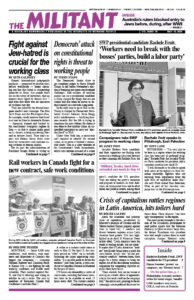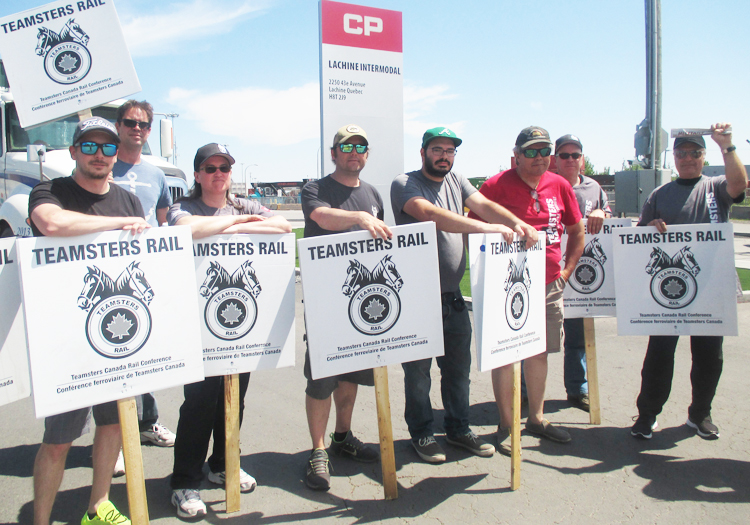MONTREAL — Some 9,300 train conductors, yard workers, train engineers and dispatchers at Canada’s two biggest rail companies — Canadian National Railway and Canadian Pacific Kansas City — are fighting for safe working conditions and livable work schedules. Their contract expired Dec. 31, and they’re debating and voting on whether to call a strike. The vote by members of Teamsters Canada Rail Conference concludes May 1.
A strike or a lockout could come as early as May 22. On April 11, the company posted an “offer” on its website, bypassing the union negotiating committee. “It is an offer made to divide the workers,” said Juan Garcia, a train conductor at Canadian National in Montreal for the past 10 years.
CN bosses are demanding a series of concessions, including that union members have to be available to work 12 hours every shift. The current contract allows workers to stop working after 10 hours if they’re too tired to go longer. They want to cut the current personal leave days from 10 to five, while giving most workers an extra vacation week instead.
This gives workers much less flexibility to meet their needs since personal leave days can be taken whenever workers need them, whereas vacation bids are put in at the beginning of the year and are determined by seniority. “They want to control our time off work, making sure they always have enough workers available. They want even more from us than they already have,” Loupca Fournelle, a train conductor in Montreal for the past year and a half, said.
The company offers a “guarantee” there will be no layoffs for workers employed when the contract is signed, effectively creating a two-tier setup for new hires. They also demand laid-off workers can be forced to take a job away from their terminal, anywhere across the country, if there is a shortage of workers.
The company is proposing a series of measures that would force road crews arriving at a terminal to stay on the job and break down their trains by destination. Under the current agreement, arriving crews go on rest, and regularly scheduled yard crews put the cars in order. This means cutting jobs, both Garcia and Fournelle explained.
The rail bosses are dangling a 5,000 Canadian dollars ($3,650) lump sum bribe for workers to sign the contract.
‘Seems like no choice but to strike’
“Seems like we won’t have a choice but to go on strike,” Damien Venne, a Canadian National train conductor in Montreal for the past five years, told the Militant. The company’s demands also “mean a pay cut on every long-distance train, on top of everything else we would be losing.”
At Canadian Pacific Kansas City two options were sent to union members Feb. 28, also bypassing their negotiating committee. While the strike vote is still underway, CPKC has moved to change the conditions of work, to force long-distance crews to take days off away from home without pay. Under Canadian law, previous contract terms are supposed to be respected until a new contract is signed. The company now refuses to cover chiropractic appointments and massage therapy.
‘‘Your Union Executive is taking the appropriate steps … in stopping this heinous action and violation of our members,” a union bulletin said March 28. We are “holding the employer accountable to their responsibilities to fully assess the risk and harm to the members being subjected to the ridiculously long layovers at the away-from-home terminal, in many instances in very remote locations.”
Canadian National owns about 50% of the country’s rail trackage, Canadian Pacific Kansas City, 30%. In Canada, 70% of intercity commodity exchange moves by rail and 50% of international exports. Both railways run coast to coast. The merger of Canadian Pacific and the Kansas City Southern in 2021 makes it the only railroad that runs from Canada into Mexico.
Over 3,000 train conductors and yard workers at Canadian National were on a “strike for safety” in 2019. They were followed by 750 signal and communications workers, members of the International Brotherhood of Electrical Workers, in 2022. And some 240 Unifor union members walked out at Canadian National’s Autoport in Nova Scotia in March. At CPKC, 3,000 Teamsters went out in 2018 and 2022.
As this fight unfolds, 3,000 CN track maintenance workers, members of the United Steelworkers union, are also fighting for a new contract. The negotiating committee reached a tentative agreement with the railway bosses March 1. The vote hasn’t yet been reported. Unifor union-organized truck drivers who drive for Canadian National voted 82% to give a strike mandate to their leadership. These two contracts also expired at the end of last year.


